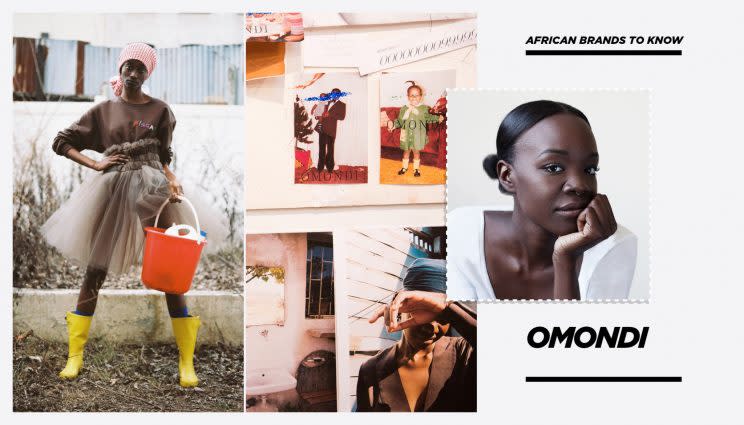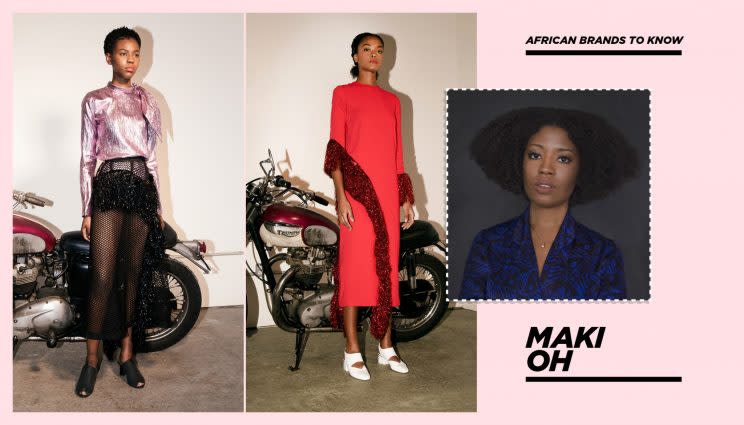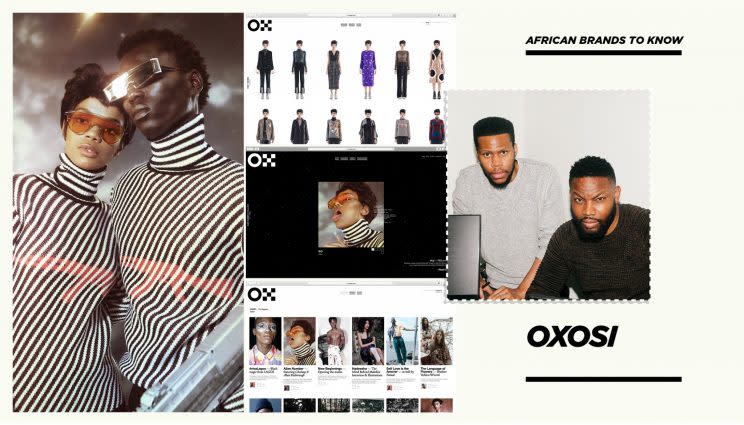Meet the 5 African Brands Shaking Up the Fashion Industry

As of late, films surrounding African-Americans like I Am Not Your Negro and Get Out have become national, viral sensations. But the focus on the African community now has been greater than ever — particularly within the fashion world. Legendary designers such as Marc Jacobs centered his entire fall/winter 2017 show in February around the ’70s hip-hop generation.
The subject of diversity has always been hotly debated in fashion, and it was one of the most contested issues in fashion this past season. Whether it pertains to size, gender, or race, the call for more diversity doesn’t just stop at models, but designer talent as well. However, we are finally seeing some progress.
A growing number of African designers are emerging as movers and shakers in the fashion industry and are helping break the perennial glass ceiling. They are rising to the top of the sartorial food chain, and as some would say — it’s about time.
We’re going to share with you five brands that all have one commonality: They’re all made by talented designers delivering African fashion on a global scale.

Aurora James, Founder of Brother Vellies
Aurora James is the mastermind behind the beloved African-inspired shoe and accessory line Brother Vellies. It was born out of James’s inherent desire to meet two goals: first, to share her favorite African footwear style with the rest of the world — called the velskoen (pronounced “fell-skoon”), but known colloquially as vellies. Second, James’s mission was to do more to support African people than merely provide donated goods. As seen in the now ubiquitous 1:1 model initiated by brands like Toms, James explains to Yahoo Style, “To dump manufactured Chinese goods in Africa hurts their local industries; 70 percent of the manufacturing industry in Ethiopia has died out as a result of American donated goods.”
James would rather impart long-lasting jobs for African people. “There has been this perception that Africans are not capable and are forever in need of a handout,” James says. “But sometimes it’s not a handout that they need, it’s faith and opportunity.”
Today, Brother Vellies shoes are handmade throughout South Africa, Ethiopia, and Morocco — with Kenya being the locale for the company’s workshop where James welcomes artisans of any gender, background, and tribe to take part and assemble the shoes using their unique ancestral artisan skill sets. James continues to travel to Africa regularly for inspiration and to become immersed in the diverse African culture, as well as to work with the local artisans. But still, James has bigger dreams. “As I grow and scale, it’s a constant challenge to train people to keep up with things,” she says. “In a perfect world every single thread and button would be made on the continent in a really beautiful natural way.”
The brand has since gone on to win the prestigious 2015 CFDA/Vogue Fashion Fund and was nominated for the CFDA Swarovski Award for Accessory Design in 2016.

Recho Omondi, Founder of Omondi
Recho Omondi is the founder of the line Omondi. You might recognize the young designer for her signature colorful crewneck sweaters, which have recently popped up all over your Instagram feed. They’ve been wore by fashion’s elite, including Teen Vogue EIC Elaine Welteroth, editorial director of New York magazine Stella Bugbee, and founder of Glossier Emily Weiss. The sweaters all charmingly display the wearers’ surnames hand-stitched into the fabric. But aside from the names of fashion editors, Omondi has also stitched more controversial words such as “N****s” in celebration of Black History Month. Omondi is unapologetic about the “controversy.” “It was tongue-in-cheek, and the people who understand it are buying it,” she tells Yahoo Style. “There’s something curious about a socially charged ‘curse word’ hand-sewn into pastel embroidery.”
Despite the sweaters’ widespread popularity, they are only a small portion of what the Omondi brand is all about. Growing up, Omondi split her time between Nairobi, Kenya, and parts of middle America, where she moved around between Oklahoma, Kansas, Michigan, and Illinois.
Omondi had worked stints at Calvin Klein, Suno, and Theory before launching her own brand in 2014. Her aesthetic can best be described as a junction between her Kenyan roots and NYC’s downtown cool street scene. It’s contemporary, seasonless, and non-gender-specific.
The designer is proud of her strong voice and self-assurance, which she credits to her rearing. “I was never told I couldn’t achieve things,” Omondi says. “In fact I was told the opposite — that I could do anything.” Omondi hopes to use her line to “inspire and encourage” all women, regardless of color.

Lisa Folawiyo, Founder of Lisa Folawiyo
Lisa Folawiyo is known for her luxurious and opulent take on a West African-style print known as Ankara. Her designs possess the spirit and liveliness of African culture, but reinterpreted in a contemporary fashion through her custom-made Ankara-like prints, “texturizing [it] with embellishments whilst creating modern silhouettes.”
Folawiyo works with a team of talented artisans who help add a luxurious hand-made opulence through their intricate beadwork, which at times can take up to 240 hours to make for each garment. “We took a quintessentially African fabric and gave it a very modern, luxurious language,” Folawiyo tells Yahoo Style. However, she continues to look to Africa for inspiration, “From the Fulani (Northern Nigerian tribe) culture to childhood trips back to my father’s hometown and the Lagos Skyline, we dig deep into our roots and find various aspects of our culture that inspire and innovate.”
Without any technical training, Folawiyo launched her line in her home after the birth of her daughter in 2005. Since then, the designer has become a major success among celebrities, such as Hollywood starlet Lupita Nyong’o as well as Beyoncé’s sister, Solange Knowles — seeing as they not only champion a wide variety of designers, but they also “are creatives who continue to celebrate fashion individualism,” says Folawiyo.

Amaka Osakwe, Founder of Maki Oh
Amaka Osakwe established her brand Maki Oh in 2010 and counts former first lady Michelle Obama, Lupita Nyong’o, and Beyoncé among her fans. How did Osakwe react when she found out these extraordinary female leaders wore her line? “Excited.com.uk.org.co.za,” Osakwe tells Yahoo Style.
During New York Fashion Week in February, Osakwe made headlines by casting all black models for her presentation, something she has done since she started her line in Lagos, Nigeria, where Osakwe is based. Her collections place a strong emphasis on identity and culture, fusing African techniques within a contemporary lens. “The aim has always been to celebrate my culture,” she says. “I definitely want to highlight the depth and finesse that lies in traditional African artistry, preserving its elegance and true beauty.”
Her clothes are meant to function as a type of narrative. “I see them as forms of communication in the same way traditional African clothing was worn,” she elaborates. “They are pieces of a wider story about the beauty and strength of women. It’s wonderful to have had our clothing communicate with these women.”
It was largely through Instagram that Osakwe’s brand found a firmer footing within the American market. The designer was contacted through the social media platform by Sherri McMullen, an Oakland boutique owner who helped put the designer in touch with mega e-commerce retailer Farfetch. Osakwe explains, “These types of collaborations continue to be exciting because the world keeps getting smaller. Instagram has made it so much easier and quicker to tell the world our stories. In a few DMs, we have been connected to individuals and stores around the world. I’m thrilled to see what the future holds for more connections like these.”

Akin Adebowale and Kolade Adeyemo, Co-Founders of Oxosi
Oxosi is an e-commerce platform that bridges the gap between luxury contemporary African fashion and global visibility. Launched in 2015, it features a three-part business model: e-commerce, content, and community.
Designers such as Amaka Osakwe and Lisa Folawiyo were part of Oxosi’s first series of trunk shows. They released limited pieces online for sale with the idea of bringing native African brands to a global marketplace, with hope of generating commerce that will directly contribute to the brands as well as to the African economy.
In the case of Osakwe, Oxosi did much more than just hold a trunk show. “We partnered with Maki Oh to present her F/W17 collection during New York Fashion Week,” Adebowale tells Yahoo Style. “We made sure it was not your typical fashion presentation by adding some key Oxosi elements, such as the Oxosi Fuji Ambassadors (a traditional African band) and recreating an authentic Nigerian street scene. It was a major success and a unique opportunity to amplify Maki’s brand in tandem with ours.”
The Oxosi founders’ goals extend much further than simply commerce. “It’s not only about selling clothes, but also about providing access to an Afromodernist perspective that has not been explored,” says Adeyemo. Adebowale adds, “We think it’s important to continue to work with our designers to showcase their talent and share their vision. The relationship with our designers is reciprocal, and we definitely want to continue to collaborate in nontraditional ways.”
With partners like Oxosi, African designers are well positioned to expand their outreach and hopefully become a much bigger part of the global fashion community.
Read more from Yahoo Style + Beauty:
Follow us on Instagram, Facebook, and Pinterest for nonstop inspiration delivered fresh to your feed, every day. For Twitter updates, follow @YahooStyle and @YahooBeauty.


